-
ORIGINAL ARTICLE10-09-2023
Women’s Childbirth Experiences During COVID-19 Pandemic in Indonesia
Revista Brasileira de Enfermagem. 2023;76:e20220640
Abstract
ORIGINAL ARTICLEWomen’s Childbirth Experiences During COVID-19 Pandemic in Indonesia
Revista Brasileira de Enfermagem. 2023;76:e20220640
DOI 10.1590/0034-7167-2022-0640
Views0See moreABSTRACT
Objective:
Explore in depth the experiences of women giving birth during the COVID-19 pandemic in Indonesia.
Methods:
Qualitative research with a descriptive phenomenological. A total of 16 participants did not suffer from COVID-19 and gave birth during the COVID-19 pandemic in the community setting area.
Results:
There are five themes: 1: Feelings of anxiety and fear of giving birth in hospitals are experienced by women giving birth during the COVID-19 pandemic, 2. Screening for COVID and health protocols applied in hospitals during the COVID-19 pandemic, 3. Support from husbands, families, and health workers is needed when giving birth during the COVID-19 pandemic, 4. Lack of family visits hours is an obstacle during childbirth, particularly during the COVID-19 pandemic, and 5: Bonding attachment between mother and baby while at the hospital.
Conclusion:
Optimal maternity nursing care and supporting health facilities and public policies will help mothers give birth during the COVID-19 pandemic in Indonesia.
-
10-09-2023
Patient safety with covid-19 in hospital units: a scoping review
Revista Brasileira de Enfermagem. 2023;76:e20220557
Abstract
Patient safety with covid-19 in hospital units: a scoping review
Revista Brasileira de Enfermagem. 2023;76:e20220557
DOI 10.1590/0034-7167-2022-0557
Views0See moreABSTRACT
Objective:
Map, in the scientific literature, the actions taken to promote the safety of patients with covid-19 in the hospital context.
Methods:
This is a scoping review according to the Joanna Briggs Institute, using the Checklist Preferred Reporting Items for Systematic Reviews and Meta-Analyses Extension for Scoping Reviews. In April 2022, searches were performed on nine data sources. The results were summarized in a table and analyzed descriptively.
Results:
Fifteen studies were selected to compose the final sample. Most articles refer to cohort studies, followed by clinical trials. As for the areas of activity, there was a predominance of surgical centers, followed by adult and pediatric Intensive Care Units.
Conclusions:
With this review, it was possible to map measures such as contingency plans and reorganization of beds, rooms, and operating rooms, in addition to the isolation and distancing practiced by patients and professionals.
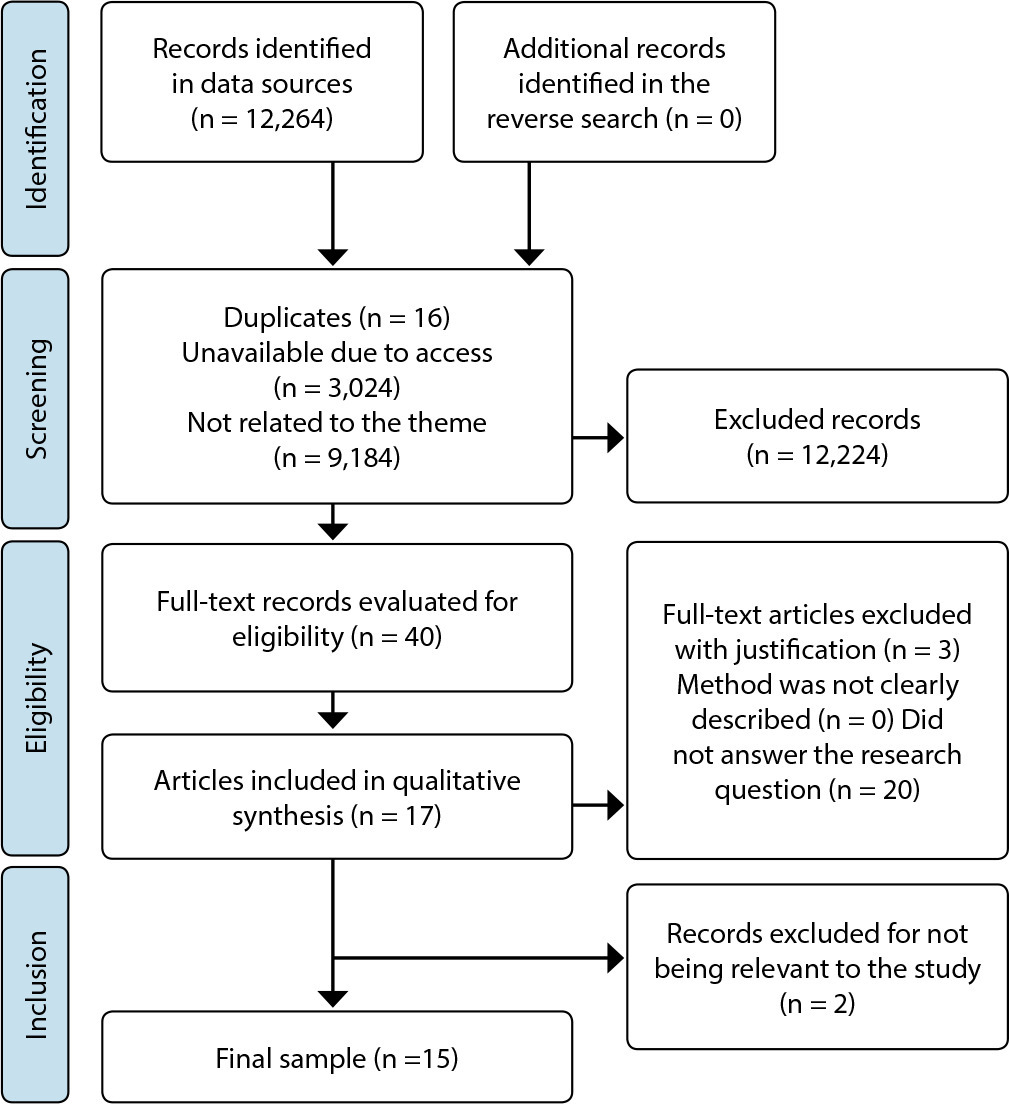
-
10-09-2023
A pós-pandemia de COVID-19: perspectivas da atuação profissional na enfermagem
Revista Brasileira de Enfermagem. 2023;76:e76Suppl101
Abstract
A pós-pandemia de COVID-19: perspectivas da atuação profissional na enfermagem
Revista Brasileira de Enfermagem. 2023;76:e76Suppl101
DOI 10.1590/0034-7167.202376Suppl101pt
Views0Durante a pandemia de COVID-19, os trabalhadores de enfermagem foram essenciais na prestação de cuidados à saúde, diante do elevado número de pessoas infectadas pelos vírus SARS-CoV-2 e adoecidos pela COVID-19 e pela Síndrome Respiratória Aguda Grave (SRAG). Neste contexto, os serviços de saúde ficaram sobrecarregados, e muitos de seus profissionais adoeceram e morreram.A enfermagem […]See more -
ORIGINAL ARTICLE10-09-2023
Transition of care in post-hospitalization patients due to covid-19 in a hospital in northeastern Brazil
Revista Brasileira de Enfermagem. 2023;76:e20230030
Abstract
ORIGINAL ARTICLETransition of care in post-hospitalization patients due to covid-19 in a hospital in northeastern Brazil
Revista Brasileira de Enfermagem. 2023;76:e20230030
DOI 10.1590/0034-7167-2023-0030
Views0See moreABSTRACT
Objective:
To analyze the transition of care for post-hospitalization patients due to covid-19 in a hospital in northeastern Brazil.
Methods:
Quantitative, cross-sectional, descriptive, and analytical study carried out between 2020 and 2021. The sample had 78 patients. Data collection took place by telephone with the support of a sociodemographic questionnaire and the care transition assessment instrument (Care Transitions Measure).
Results:
The average length of stay was 24.04 days. The average score for care transition was 71.68 (±11.71). “Self-management training” and “Understanding of medications” had higher averages, 75.15 (±13.76) and 74.10 (±16.20).
Conclusions:
The average length of stay was 24.04 days. The average score for care transition was 71.68 (±11.71). “Self-management training” and “Understanding of medications” had higher averages, 75.15 (±13.76) and 74.10 (±16.20).
-
10-09-2023
Experiências de parto de mulheres durante a pandemia de COVID-19 na Indonésia
Revista Brasileira de Enfermagem. 2023;76:e20220640
Abstract
Experiências de parto de mulheres durante a pandemia de COVID-19 na Indonésia
Revista Brasileira de Enfermagem. 2023;76:e20220640
DOI 10.1590/0034-7167-2022-0640
Views0See moreRESUMEN
Objetivo:
Explorar en profundidad las experiencias de las mujeres que dieron a luz durante la pandemia de COVID-19 en Indonesia.
Métodos:
Investigación cualitativa con enfoque fenomenológico descriptivo. Un total de 16 participantes que no sufrieron de COVID-19 dieron a luz durante la pandemia de COVID-19 en el entorno comunitario.
Resultados:
Hay cinco temas: 1: Los sentimientos de ansiedad y miedo de dar a luz en los hospitales son experimentados por las mujeres que dan a luz durante la pandemia de COVID-19, 2. Detección de COVID y protocolos de salud aplicados en los hospitales durante la pandemia de COVID-19, 3. Se necesita el apoyo de esposos, familias y trabajadores de la salud cuando se da a luz durante la pandemia de COVID-19, 4. La falta de horarios de visitas familiares es un obstáculo durante el parto, particularmente durante la pandemia de COVID-19, y 5: Vínculo entre madre y bebé mientras están en el hospital.
Conclusión:
la atención de enfermería de maternidad óptima y el apoyo de los centros de salud y las políticas públicas ayudarán a las madres a dar a luz durante la pandemia de COVID-19 en Indonesia.
-
10-09-2023
Comportamentos saudáveis e risco de doenças cardiovasculares entre docentes de enfermagem durante a pandemia de COVID-19
Revista Brasileira de Enfermagem. 2023;76:e20220372
Abstract
Comportamentos saudáveis e risco de doenças cardiovasculares entre docentes de enfermagem durante a pandemia de COVID-19
Revista Brasileira de Enfermagem. 2023;76:e20220372
DOI 10.1590/0034-7167-2022-0372
Views0See moreRESUMEN
Objetivo:
Las enfermedades cardiovasculares son la primera causa de muerte en todo el mundo. La adopción de hábitos de vida que promuevan la salud mantendrá la salud cardiovascular del individuo y reducirá el riesgo de enfermedades cardiovasculares.
Métodos:
En este estudio descriptivo, se encuestó a 150 profesores de enfermería mediante un método de muestreo no probabilístico (intencional) para evaluar su adhesión a un estilo de vida promotor de la salud con el fin de conocer el riesgo de enfermedades cardiovasculares. Para ello, se utilizó la versión árabe del Health-Promoting Lifestyle Profile II (HPLP-II).
Resultados:
Setenta y dos profesores de enfermería completaron la encuesta. Los resultados indicaron que la muestra del estudio tenía un nivel moderado de promoción de la salud basado en el Health-Promoting Lifestyle Profile II.
Conclusión:
Los profesores de enfermería corren el riesgo de desarrollar enfermedades cardiovasculares en función de sus comportamientos de promoción de la salud, ya que obtuvieron una puntuación baja en responsabilidad de salud, actividad física y gestión del estrés. Se recomienda impulsar comportamientos saludables para prevenir enfermedades crónicas como las cardiovasculares.
-
10-09-2023
The post-COVID-19 pandemic: perspectives of professional practice in nursing
Revista Brasileira de Enfermagem. 2023;76:e76Suppl101
Abstract
The post-COVID-19 pandemic: perspectives of professional practice in nursing
Revista Brasileira de Enfermagem. 2023;76:e76Suppl101
DOI 10.1590/0034-7167.202376Suppl101
Views0During the COVID-19 pandemic, nursing workers were essential in providing health care, given the high number of people infected with SARS-CoV-2 viruses and sick with COVID-19 and Severe Acute Respiratory Syndrome (SARS). In this context, health services were overloaded, and many of their professionals fell ill and died.Nursing proved to be essential during the critical […]See more -
10-06-2023
Evidências do cuidado centrado no paciente no contexto da prática profissional de saúde brasileira
Revista Brasileira de Enfermagem. 2023;76(5):e20220448
Abstract
Evidências do cuidado centrado no paciente no contexto da prática profissional de saúde brasileira
Revista Brasileira de Enfermagem. 2023;76(5):e20220448
DOI 10.1590/0034-7167-2022-0448
Views0See moreRESUMEN
Objetivos:
analizar las actitudes centradas en el paciente en el cuidado y compartir prácticas de profesionales de enfermería, logopedia, odontología y medicina.
Métodos:
se utilizó una investigación transversal con 411 profesionales, y como medida de resultado se aplicó el instrumento Patient-Practitioner Orientation Scale.
Resultados:
los médicos presentaron puntuaciones medias más altas, lo que refleja una orientación centrada en el paciente, control compartido y enfoque en la persona, con diferencia estadística para todos los dominios (p<0,02). Los odontólogos fueron los profesionales que presentaron puntajes más bajos, especialmente en el dominio compartir, con diferencia estadística en relación a los enfermeros, logopedas y médicos (p<0,05).
Conclusiones:
finalmente, las actitudes de los profesionales de las áreas de salud estudiadas indicaron preferencia autorreferida por la centralidad en los pacientes. En este contexto, el cuidado centrado en el paciente puede ser un recurso importante en el cuidado de la salud cuando se apuesta por la superación del objeto hombre.
-
EXPERIENCE REPORT01-01-2017
Focus group on qualitative research: experience report
Revista Brasileira de Enfermagem. 2017;70(2):424-429
Abstract
EXPERIENCE REPORTFocus group on qualitative research: experience report
Revista Brasileira de Enfermagem. 2017;70(2):424-429
DOI 10.1590/0034-7167-2016-0091
Views1See moreABSTRACT
Objective:
to report the experience of applying the focus group technique for production of data in qualitative research.
Method:
four group sessions were held from May to June 2015, with the participation of professionals from the public sector of PHC and from specialized service.
Results:
the way focus group was developed is described in steps: planning, recruitment, ambience, group sessions, and evaluation.
Conclusion:
we highlight that the focus group, as a technique to produce data in collective space, can contribute not only to the construction of knowledge in Nursing, but also to the research approach with the assistance practice.

-
RESEARCH01-01-2017
Guide of attributes of the nurse’s political competence: a methodological study
Revista Brasileira de Enfermagem. 2017;70(3):526-534
Abstract
RESEARCHGuide of attributes of the nurse’s political competence: a methodological study
Revista Brasileira de Enfermagem. 2017;70(3):526-534
DOI 10.1590/0034-7167-2016-0483
Views0See moreABSTRACT
Objective:
To build and validate a guide of attributes of the nurse’s political competence.
Method:
Methodological research. This study comprised the construction of the instrument through literature review; experts validation of pre-established attributes for composing the guide; and clinical validation in the nurses work environment/reality. The data collection took place in the months from August to October 2014, and the analysis was based on the content analysis of Bardin and use of Epi info 3.5. All ethical precepts have been complied with.
Results:
From 29 attributes found in the literature, 25 have been validated by experts. Clinical/practical validation involved the participation of 43 nurses, who observed that the attributes are not articulated with the professional practices developed by them.
Conclusion:
The attributes of the nurse’s political competence were identified with support of literature. It is concluded that the professionals still have limited and fragmented perception of political competence, expressing difficulty/limitation.
-
ORIGINAL ARTICLE10-09-2023
Independent and combined effects of lifestyle behaviors on adolescent health-related quality of life
Revista Brasileira de Enfermagem. 2023;76(4):e20220780
Abstract
ORIGINAL ARTICLEIndependent and combined effects of lifestyle behaviors on adolescent health-related quality of life
Revista Brasileira de Enfermagem. 2023;76(4):e20220780
DOI 10.1590/0034-7167-2022-0780
Views0See moreABSTRACT
Objective:
To investigate the independent and combined effects of lifestyle behaviors, including physical activity, sedentary behavior, sleep duration and food intake, in the health-related quality of life (HRQoL) of Brazilian adolescents.
Methods:
Cross-sectional school-based study, with the participation of 306 adolescents aged 14 to 18 years. A questionnaire was applied with structured questions to collect lifestyle behaviors data. Perception of the HRQoL was identified using the Kidscreen-27. The study used covariance analysis and linear regression models for statistical analysis.
Results:
Adolescents who reported ≤ 2 hours/day of screen-based sedentary behavior and sleep duration equivalent to 8-10 hours/night presented significantly higher HRQoL. Adolescents who reported joint adherence ≥ 3 healthy lifestyle behaviors demonstrated approximately two [OR=2.12] to three times [OR=3.04] more chance of presenting higher perceptions of HRQoL.
Conclusion:
Although healthy lifestyle behaviors had a positive independent effect on HRQoL, joint adherence to healthy behaviors enhances the cumulative effect.

-
12-04-2023
Sleep quality of nurses who worked in coping with COVID-19: an integrative review
Revista Brasileira de Enfermagem. 2023;76(6):e20230007
Abstract
Sleep quality of nurses who worked in coping with COVID-19: an integrative review
Revista Brasileira de Enfermagem. 2023;76(6):e20230007
DOI 10.1590/0034-7167-2023-0007
Views0See moreABSTRACT
Objective:
to analyze sleep quality of nurses who worked coping with COVID-19 in scientific evidence.
Methods:
an integrative review, carried out in seven databases, including studies between December 2021 and June 2022, without language restrictions. The sample consisted of 15 primary studies.
Results:
nurses working in hospital, intensive care, outpatient care and teaching institutions constitute a vulnerable group for sleep disorders: latency, duration, efficiency and quality. The disorders identified involved insomnia at varying levels of severity: daytime dysfunction and morning sleepiness. Night work and low capacity for self-care were determinants of impaired sleep patterns.
Final considerations:
the COVID-19 pandemic contributed to greater vulnerability of nurses to changes in sleep, requiring strategies for risk management and well-being promotion.

-
ORIGINAL ARTICLE12-08-2023
Care for older adults with disabilities in Long Term Care Facility
Revista Brasileira de Enfermagem. 2023;76:e20220767
Abstract
ORIGINAL ARTICLECare for older adults with disabilities in Long Term Care Facility
Revista Brasileira de Enfermagem. 2023;76:e20220767
DOI 10.1590/0034-7167-2022-0767
Views0See moreABSTRACT
Objective:
to analyze the constitution of care offered to older adults with disabilities, from Long Term Care Facility professionals’ perspective.
Methods:
this is a discourse analysis based on the post-structuralist framework. Participants in this study are professionals involved in the care for older adults, totaling 14 respondents, 13 women and one man.
Results:
from professionals’ perspective, there is a fine line between caring for older adults with disabilities and maintaining their autonomy. Care in which autonomy is restricted predisposes older adults to a process of dependency.
Final considerations:
caring for older adults with disabilities constitutes the challenge between caring and maintaining independence. Thus, older adult-centered care should be taken as a premise so that their individualities are respected.
-
ORIGINAL ARTICLE12-08-2023
Polypharmacy, potentially inappropriate medications and associated factors among older adults with hypertension in primary care
Revista Brasileira de Enfermagem. 2023;76:e20220785
Abstract
ORIGINAL ARTICLEPolypharmacy, potentially inappropriate medications and associated factors among older adults with hypertension in primary care
Revista Brasileira de Enfermagem. 2023;76:e20220785
DOI 10.1590/0034-7167-2022-0785
Views0See moreABSTRACT
Objective:
to identify the prevalence and associations of polypharmacy and potentially inappropriate medication use among older adults with hypertension treated in primary care.
Methods:
a cross-sectional study carried out with older adults with hypertension treated at a Family Health Strategy unit. Data collection included analysis of medical records, interviews and multidimensional assessment of older adults. Socio-demographic information and clinical variables were collected. Statistical analysis was performed by multiple logistic regression.
Results:
polypharmacy prevalence was 38.09%, and potentially inappropriate medication (PIM), 28.57%. There was a significant association between polypharmacy and PIM use, altered sleep and ethnicity. PIM use was associated with polypharmacy, worse family functioning, and absence of a caregiver. Cognitive decline reduces the prevalence of these medications.
Conclusions:
polypharmacy and PIM use among older adults with hypertension represent a problem in this population, especially among the most vulnerable.
-
REVIEW12-08-2023
Educational technologies used to promote self-care for people with diabetes mellitus: integrative review
Revista Brasileira de Enfermagem. 2023;76:e20230049
Abstract
REVIEWEducational technologies used to promote self-care for people with diabetes mellitus: integrative review
Revista Brasileira de Enfermagem. 2023;76:e20230049
DOI 10.1590/0034-7167-2023-0049
Views0See moreABSTRACT
Objective:
To summarize the scientific productions that used educational technologies to promote self-care for people with diabetes.
Method:
Integrative review carried out from October 2022 to January 2023, in the databases: LILACS; Scopus; Embase; PubMed/MEDLINE and CINAHL. The search was paired, and the sample consisted of ten articles. The levels of evidence were analyzed by the Hierarchy of Evidence for Intervention Studies, and the results were synthesized for interpretation of the findings.
Results:
The educational technologies identified to promote self-care were: mobile applications, interactive platforms, print, telemonitoring, video and simulation. The focus of the contents was on the promotion of foot care, prevention of neuropathy, self-management, knowledge, and expectation of people with diabetes and prevention of acute complications.
Conclusion:
The synthesis of knowledge about educational technologies to promote self-care for people with diabetes pointed to the need for robust evidence.

-
ORIGINAL ARTICLE05-03-2024
What is the burden of multimorbidity and the factors associated with its occurrence in elderly Brazilians?
Revista Brasileira de Enfermagem. 2024;77(1):e20220809
Abstract
ORIGINAL ARTICLEWhat is the burden of multimorbidity and the factors associated with its occurrence in elderly Brazilians?
Revista Brasileira de Enfermagem. 2024;77(1):e20220809
DOI 10.1590/0034-7167-2022-0809
Views0See moreABSTRACT
Objective:
To estimate the prevalence of multimorbidity in elderly people and its association with sociodemographic characteristics, lifestyle, and anthropometry.
Methods:
This was a cross-sectional study using data from the National Health Survey, 2019. A total of 22,728 elderly individuals from all 27 Brazilian states were randomly selected. Poisson regression models with robust variance were employed, and a significance level of 5% was adopted.
Results:
The prevalence of multimorbidity was 51.6% (95% CI: 50.4-52.7), with the highest estimates observed in the South and Southeast. Multimorbidity was associated with being female (aPR = 1.33; 95% CI: 1.27-1.39), being 80 years old or older (aPR = 1.12; 95% CI: 1.05-1.19), having low education (aPR = 1.16; 95% CI: 1.07-1.25), past cigarette use (aPR = 1.16; 95% CI: 1.11-1.21), insufficient physical activity (aPR = 1.13; 95% CI: 1.06-1.21), and screen use for 3 hours or more per day (aPR = 1.13; 95% CI: 1.08-1.18).
Conclusion:
Multimorbidity affects more than half of the elderly population in Brazil and is associated with social, demographic, and behavioral factors.

-
12-05-2019
Hospital care and urinary incontinence in the elderly
Revista Brasileira de Enfermagem. 2019;72:284-293
Abstract
Hospital care and urinary incontinence in the elderly
Revista Brasileira de Enfermagem. 2019;72:284-293
DOI 10.1590/0034-7167-2018-0273
Views0See moreABSTRACT
Objective:
to identify factors inherent in hospital care that favor urinary incontinence in the elderly.
Method:
an integrative review with Scopus, CINAHL and Pubmed searches. Includes original articles, no language restriction, published between 2008 and 2018. Rated level of recommendation and level of evidence were assessed using the Oxford Center for Evidence-Based Medicine classification. Exploited content through thematic analysis in light of the Donabedian model.
Results:
13 articles constituted the sample. There were factors such as the unjustified and indiscriminate use of devices such as the geriatric diaper; hospital structure adversely affecting the needs of the elderly; and deficit in screening, risk identification and underreporting of the problem favor urinary incontinence in the hospitalized elderly.
Conclusion:
modifiable factors related to hospital structures and care processes favor both the onset and worsening of urinary incontinence in the elderly.
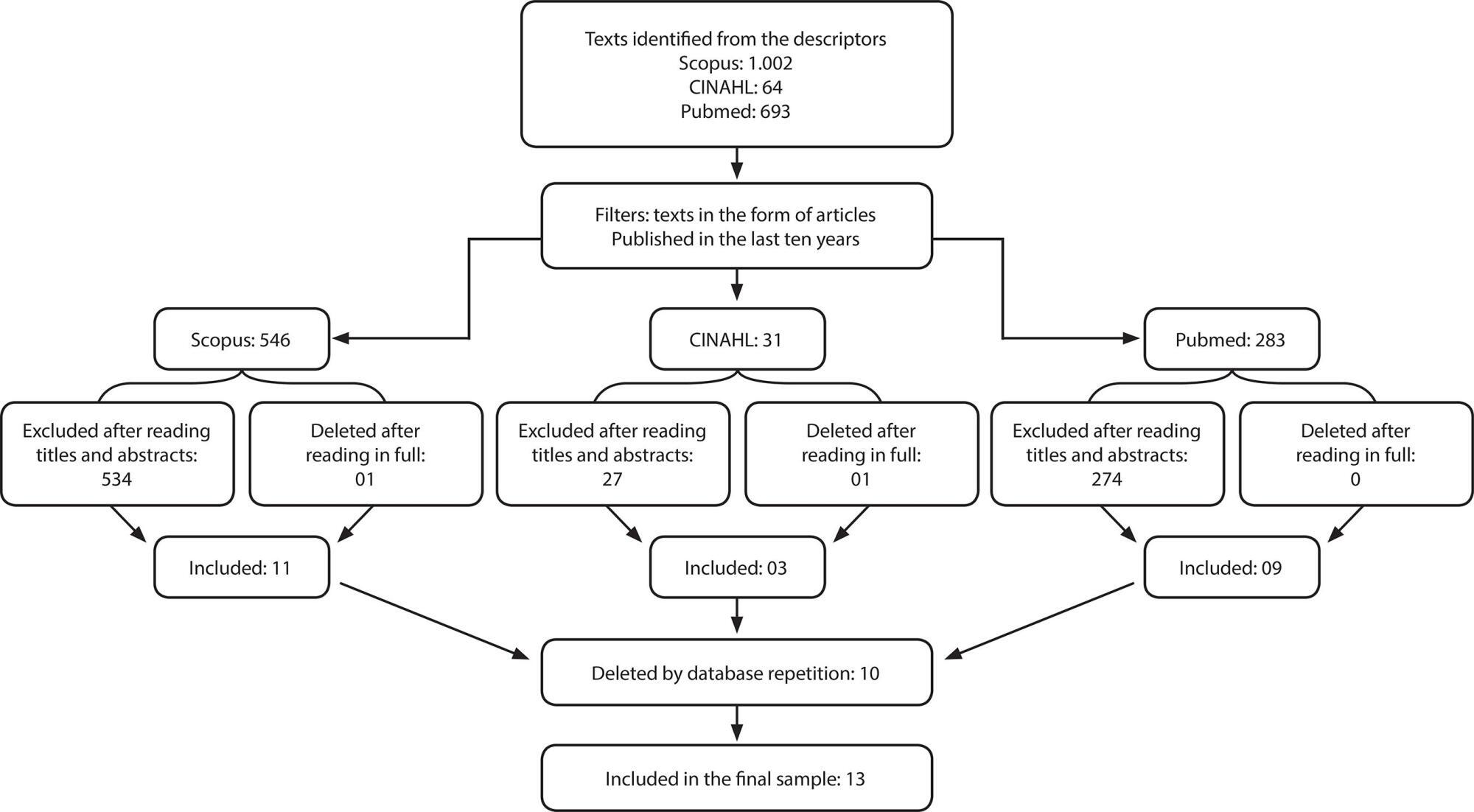
-
ORIGINAL ARTICLE06-27-2019
Nurse safety culture in the services of a university hospital
Revista Brasileira de Enfermagem. 2019;72(3):767-773
Abstract
ORIGINAL ARTICLENurse safety culture in the services of a university hospital
Revista Brasileira de Enfermagem. 2019;72(3):767-773
DOI 10.1590/0034-7167-2018-0376
Views0See moreABSTRACT
Objective:
To evaluate nurse safety culture in a teaching hospital, as well as to verify differences in the safety culture dimensions between services.
Method:
cross-sectional, quantitative study, conducted from October to December 2015, in a university hospital. The instrument Hospital Survey on Patient Safety Culture was applied.
Results:
A total of 195 nurses from four different services participated in the study. Significant difference between services were identified for five dimensions of safety culture: organizational learning (P=0.012); return of information and communication about error (P=0.014); management support for patient safety (P=0.001); general perceptions about patient safety (P=0.005); and frequency of event notification (P=0.003).
Conclusion:
The medical clinic service had the highest statistical difference between the dimensions. These evaluations allow managers to identify the differences between the same hospital’s services, serving as a warning and assisting in the services’ improvement.
-
REVIEW05-18-2020
Effects of acupuncture in patients with chronic kidney disease: a systematic review
Revista Brasileira de Enfermagem. 2020;73(4):e20180784
Abstract
REVIEWEffects of acupuncture in patients with chronic kidney disease: a systematic review
Revista Brasileira de Enfermagem. 2020;73(4):e20180784
DOI 10.1590/0034-7167-2018-0784
Views0See moreABSTRACT
Objectives:
to analyze the effects of acupuncture techniques in patients with chronic kidney disease.
Methods:
a systematic review conducted in six databases, from September to December 2017, following the Preferred Reporting Items for Systematic Reviews and Meta-Analyses’ criteria. The following descriptors were used: Acupuncture AND Chronic Renal Insufficiency AND Clinical Trial.
Results:
nine studies were selected; the acupuncture techniques used were auriculotherapy, electroacupuncture and acupressure aimed at improving quality of life, fatigue, sleep and clinical variables of the disease. The studies that assessed quality of life, sleep and fatigue presented significant benefits. Studies that assessed quality of life, sleep and fatigue presented significant benefits. There was no statistical significance in the improvement of serum creatinine levels and glomerular filtration rate. Methodological and assessment tools’ divergence made impossible meta-analysis
Conclusions:
studies reinforce the positive effect of acupuncture in improving quality of life, fatigue and sleep in patients.
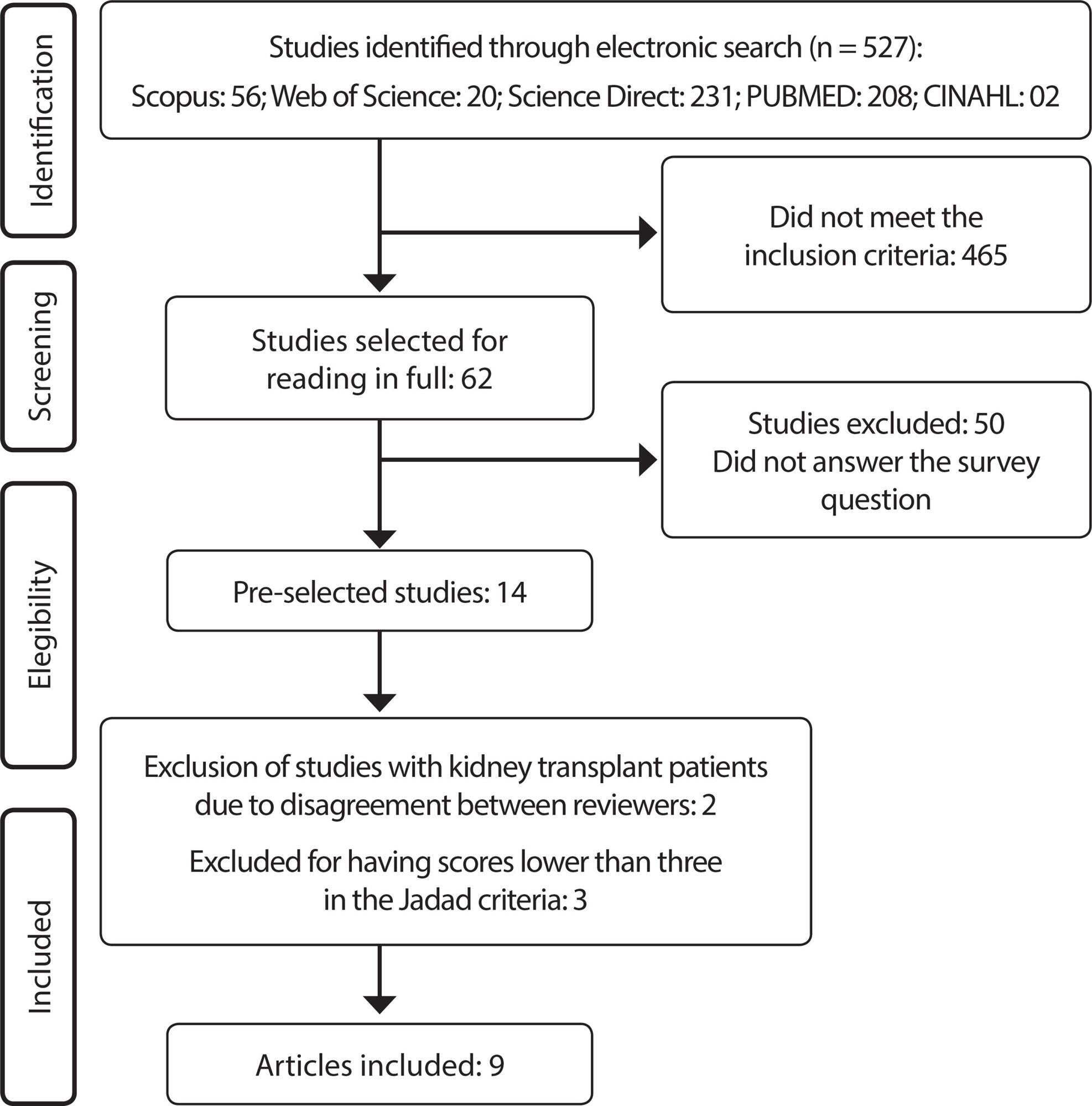
-
ORIGINAL ARTICLE05-15-2020
Configuration of power relations in physicians and nurses’ professional practices
Revista Brasileira de Enfermagem. 2020;73:e20180629
Abstract
ORIGINAL ARTICLEConfiguration of power relations in physicians and nurses’ professional practices
Revista Brasileira de Enfermagem. 2020;73:e20180629
DOI 10.1590/0034-7167-2018-0629
Views0See moreABSTRACT
Objective:
to analyze the configuration of power relations constituted in and by the knowledge and daily practices of physicians and nurses in an Intensive Care Unit (ICU).
Method:
qualitative study in which data were collected through interviews with physicians and nurses from an ICU of a hospital in Belo Horizonte, Minas Gerais. A semi-structured script was used. Data were analyzed through discourse analysis in a Foucaultian perspective.
Results:
three categories were developed – Professional Identity: self-recognition in the profession; Discipline: individualizing attitudes or collective need?; and Circularity of knowledge and power in the constitution of daily practices.
Final considerations:
the identity, discipline and circulation of power are connected in a continuous movement of subjectivation of the subject, which, in turn, uses discourse as a persuasion strategy to modify the position taken over in different situations thereby causing the circulation of power.
-
ORIGINAL ARTICLE12-05-2019
Perception of body image and nutritional status in adolescents of public schools
Revista Brasileira de Enfermagem. 2019;72:229-235
Abstract
ORIGINAL ARTICLEPerception of body image and nutritional status in adolescents of public schools
Revista Brasileira de Enfermagem. 2019;72:229-235
DOI 10.1590/0034-7167-2018-0644
Views0See moreABSTRACT
Objective:
To assess body image dissatisfaction among adolescents from Northern Minas Gerais.
Method:
This is a cross-sectional study with adolescents of both sexes, enrolled in the sixth to ninth year in the municipal public education network. A questionnaire was used, composed of sociodemographic and body image variables, which was obtained through a scale of silhouette figures. The anthropometric measurements of weight and height were performed to estimate body mass index. The correlation between the classification of the body mass index and the body image of adolescents was estimated through weighted Kappa.
Results:
A total of 535 adolescents participated, and 24.5% had different classifications between the real and ideal body image. The Kappa index for the classification of body image was 0.51, 0.58 and 0.32 for the total of adolescents, girls and boys, respectively.
Conclusion:
Public school adolescents are dissatisfied with their self-body image.
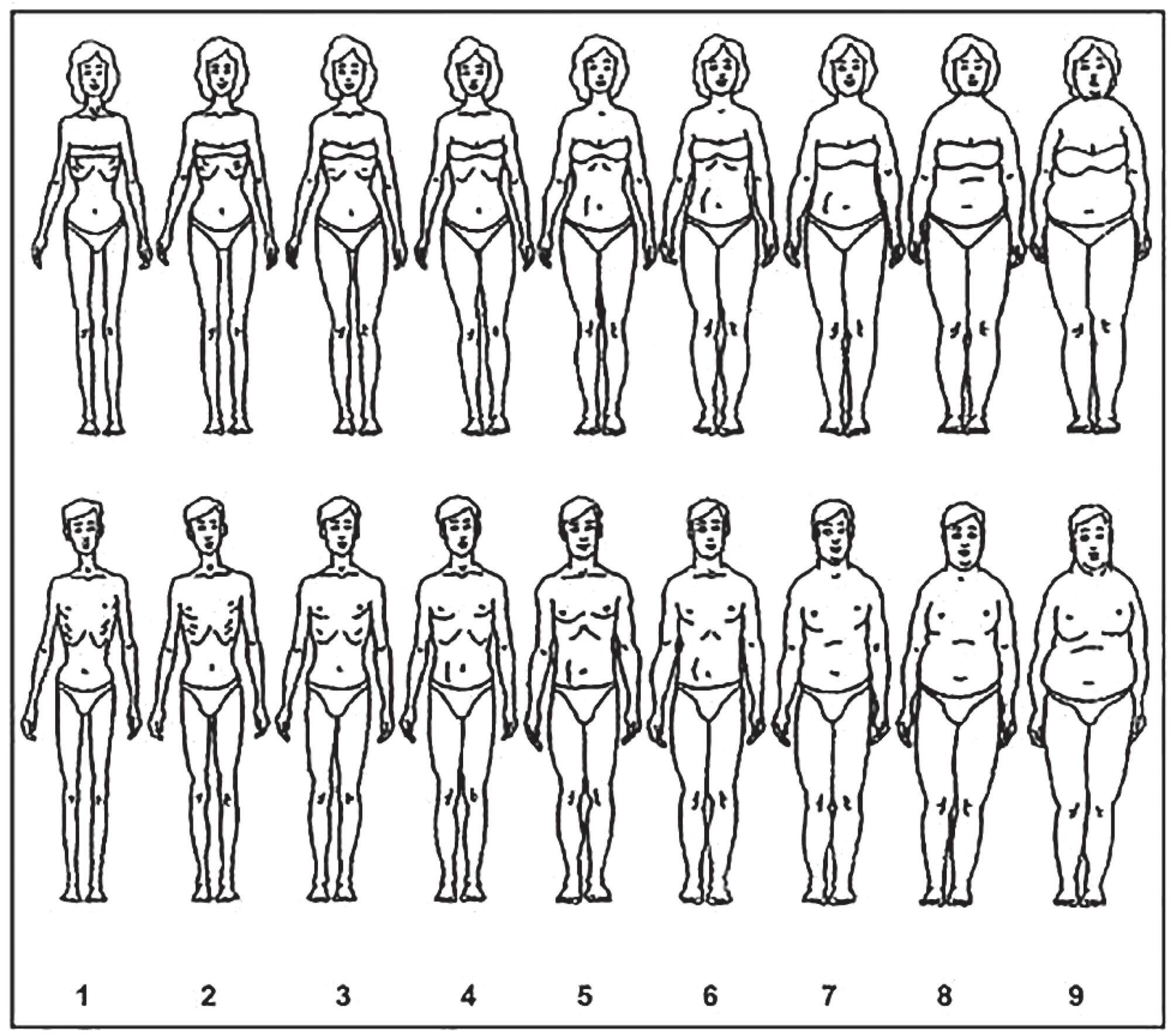
-
07-05-2021
Selenium concentrations in elderly people with Alzheimer’s disease: a cross-sectional study with control group
Revista Brasileira de Enfermagem. 2021;74:e20200984
Abstract
Selenium concentrations in elderly people with Alzheimer’s disease: a cross-sectional study with control group
Revista Brasileira de Enfermagem. 2021;74:e20200984
DOI 10.1590/0034-7167-2020-0984
Views0See moreABSTRACT
Objective:
To investigate possible differences in plasma and erythrocyte concentrations of selenium among elderly with and without a diagnosis of Alzheimer’s disease (AD).
Methods:
Cross-sectional study, performed with an elderly group with Alzheimer’s disease, diagnosed by a geriatric doctor, and compared to an elderly group without the disease, equaling gender, education, and age. Atomic absorption spectrophotometry determined plasma and erythrocyte concentrations of total selenium (Set).
Results:
The mean age was 74.41±7.1 years in the Alzheimer’s disease group and 71.46±5.1 years among the control group. The Alzheimer’s disease group presented lower plasma concentrations (mean of 45.29±14.51 µg/dL vs. 55.14±14.01 µg/dL; p=0.004), and erythrocyte Set (median of 56.36 µg/L vs. 76.96 µg/L; p<0.001). The logistic regression model indicated an association between erythrocyte Set concentrations and diagnosis of Alzheimer’s disease (p=0.028).
Conclusion:
Elderly with Alzheimer’s disease present lower selenium concentrations in the evaluated organic compartments.
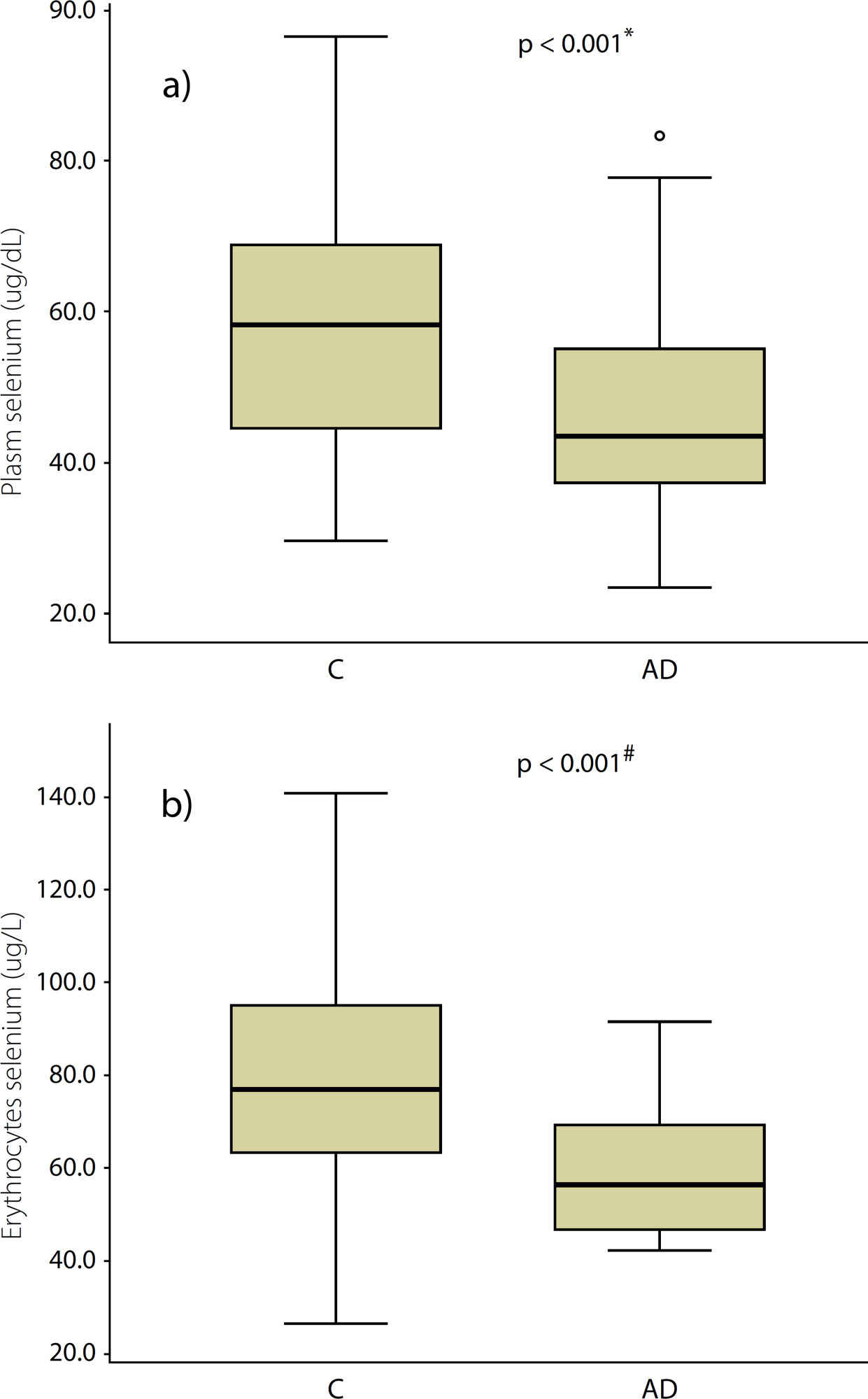
-
ORIGINAL ARTICLE10-21-2019
Mental health in primary health care: health-disease according to health professionals
Revista Brasileira de Enfermagem. 2019;72(6):1609-1617
Abstract
ORIGINAL ARTICLEMental health in primary health care: health-disease according to health professionals
Revista Brasileira de Enfermagem. 2019;72(6):1609-1617
DOI 10.1590/0034-7167-2018-0743
Views0See moreABSTRACT
Objective:
to analyze perceptions of the Family Health Strategy (FHS) professional team about mental health-disorder and to identify health actions developed by the team for people with mental disorders.
Method:
a qualitative study of a Marxist theoretical framework and a dialectical method. 99 FHS middle and higher level professionals from São Paulo participated. Semi-structured interviews were conducted. Data were submitted to ALCESTE software and Thematic Content Analysis.
Results:
there were three empirical categories: Training in Mental Health; Perception of the FHS professional about mental health-disorder; and Health actions developed by the FHS team with people with mental disorders. Actions that converge and diverge from the psychosocial care model were identified.
Final considerations:
there is an effort from professionals to work according to the psychosocial care model, but it is necessary to invest in the Permanent Education in Health of these professionals to overcome barriers and foster successful territorial actions.
-
ORIGINAL ARTICLE03-09-2020
Quality of life at work in a central sterile processing department
Revista Brasileira de Enfermagem. 2020;73(2):e20180792
Abstract
ORIGINAL ARTICLEQuality of life at work in a central sterile processing department
Revista Brasileira de Enfermagem. 2020;73(2):e20180792
DOI 10.1590/0034-7167-2018-0792
Views1See moreABSTRACT
Objectives:
to evaluate the quality of life of nursing professionals who work in a central sterile processing department.
Methods:
a descriptive, quantitative, exploratory study, conducted with 82 nursing professionals working in the Central Sterile Processing Department of a University Hospital, from September to November 2017. A semi-structured instrument and the questionnaire “Medical Outcomes Study Short-Form 36” were used. Results: most of the participants were female, married, aged 31-40 years; 47.6% with 6-10 years of profession, and 82.9% reported working in CSPD for 1-5 years. The most affected quality of life domains were Pain, Vitality, General Health Status and Social Aspects.
Conclusions:
This study showed a need for rethinking and re-creating the labor dynamics in CSPD to improve the quality of life of these nursing professionals.
Search
Search in:
Nuvem de Tags
Adolescente (85) Atenção Primária à Saúde (239) COVID-19 (91) Criança (91) Cuidados de Enfermagem (269) Educação em Enfermagem (151) Educação em Saúde (139) Enfermagem (930) Enfermagem Pediátrica (86) Estudantes de Enfermagem (77) Estudos de Validação (131) Família (87) Idoso (208) Promoção da Saúde (99) Qualidade de Vida (104) Saúde do Trabalhador (86) Saúde Mental (145) Saúde Pública (82) Segurança do Paciente (150) Tecnologia Educacional (100)



